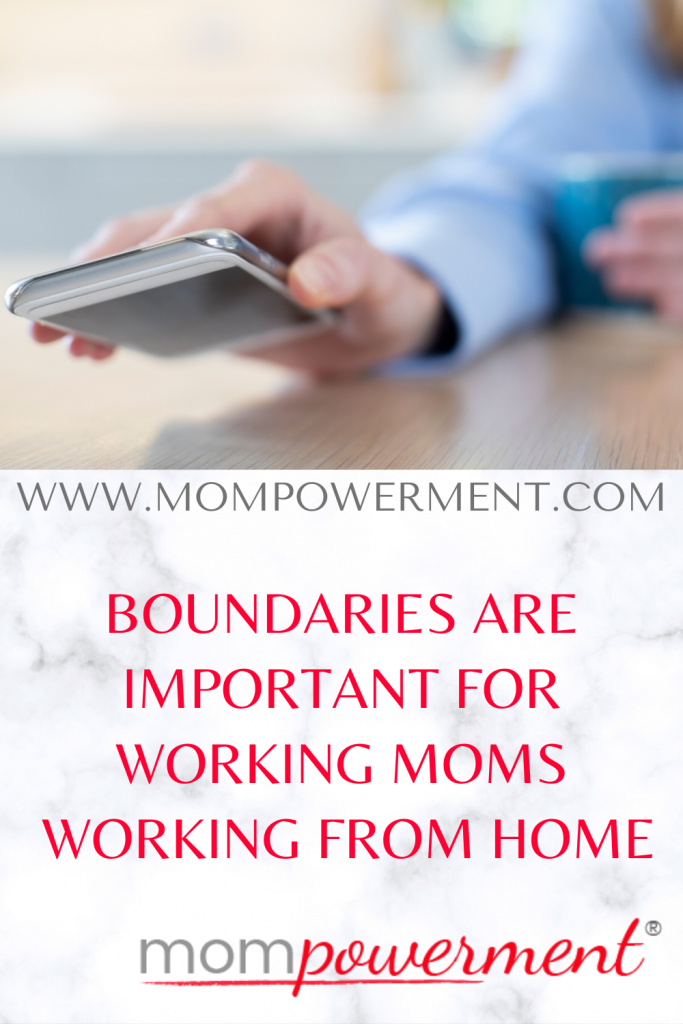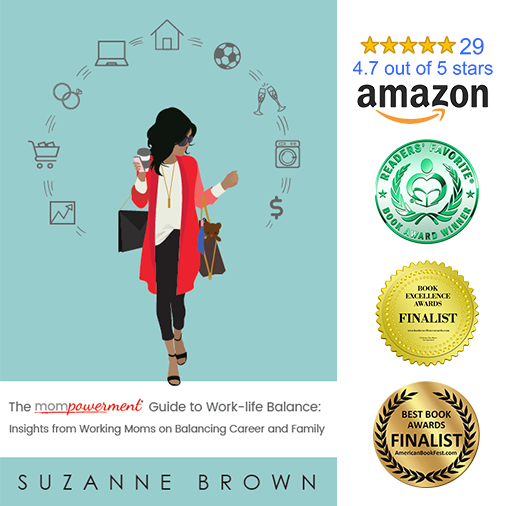
Boundaries are important for working moms working from home. As so many of us have shifted to work from home, we need boundaries more than ever. The act of walking out of the office doesn’t help us leave work behind. Those boundaries make us better at our jobs and as moms today and over time. Get insights, ideas, and tips to help you create boundaries so that you’re at your best.
Setting boundaries can be hard
As a working mom, you don’t want things to slip through the cracks. We stay connected, in part, so that we don’t miss a thing.
Let’s face it, technology is an enabler. We can be on 24/7, thanks to technology. In this time where we’ve suddenly had to shift to working from home, technology has been a sort of gift.
Really, though, it’s a blessing and a curse. Technology allows us to work from anywhere anytime, which gives us flexibility (love this!). It also enables clients, colleagues, and managers to get a hold of us whenever they choose (this is good and bad). If you combine that with people who don’t have their own boundaries, you’re in for a lot of interruptions when you work from home or take personal time. That technology that enables us to be safer and work from home also enables work to cut into family and personal time if we let it.
The importance of boundaries when working from home
So, why do boundaries at work even matter? There are several reasons and I’m focusing on three: being present, increasing productivity, and managing stress.
We all want to be present with your family and friends. Our family is important to us. They deserve and need our attention – undivided attention. We’ve definitely figured out the importance of social connections during coronavirus where we had to physically distance ourselves. Although it’s called social distancing, we needed that social connection. That doesn’t change when there isn’t a pandemic. Give you time and attention to those you care about.
We must take a break each day to increase our productivity and overall performance. You need time away from work. Who hasn’t worked on something for hours, days, or weeks, and you stop finding mistakes. Once you leave it alone and then pick it up again, you can start to improve on the work again. We need that mental break to be at our best. It gives us a fresh perspective when we engage again.
We need downtime to help us with stress management. If you’re working all the time, when do you have time for all the other stuff that helps you stay cool, calm, and collected under pressure? Sure, you might love what you do and want to work all the time. But, if you work non-stop, you aren’t giving yourself the time to do things like exercise, get enough sleep, fuel yourself from the inside out, etc. which help you with burnout. And, remember, spending time on relationships makes a difference.
Will I miss out on an opportunity?
You’re reading this post on boundaries and thinking, “It that be nice to have boundaries, but that won’t work at my company/in my industry.” Things move too quickly or too unexpectedly.
When it comes to opportunities, it’s true that we might miss some. That might not have anything to do with working from home or having boundaries, though. There are ways to create the structures so you’re not out of mind when you’re out of sight.
Two things can really help here. First, show your value. When you’re known for something, people start to seek you out. Yes, it might take an hour longer to get your input, but your client/team member/manager knows you know the answer and that answer will be exactly what he/she is looking for.
This also requires that you develop relationships ahead of time. Part of developing expertise is being able to add value to situations. It’s also about developing relationships. They’ll know you exist and know to look for you specifically. If you have a rapport already, people are willing to give you some wiggle room to wait for the answers. Develop those relationships upfront so that people know to connect to you and not simply put out a call for a response from someone.
Define work emergencies and protocols to deal with crises
The other thing I often hear about from people who hesitate to define boundaries is about crises. A crisis can happen, but what is the likelihood? Probably pretty low under normal circumstances. And, if you’re finding yourself dealing with a lot of crises back to back, that might speak to bigger issues.
Curious about how to know when it’s really a crisis? Let’s talk strategy here.
It’s moments before you’re about to sit down for dinner and your email notification on your phone dings. And you think, “What if it’s an emergency at work?” So you check your email.
Your frustration rises as you read the message, “Couldn’t this have waited until tomorrow morning?” And then you try to turn your attention to dinner and being present, calling everyone to the table (but you’re thinking about your response, right?).
Your client keeps trying to contact you, “I have a question,” is the message on her voicemail. Is it an emergency or can it wait until you’re back in work mode on Monday morning?
Even before so many of us were working from home, we were getting emails from our managers at 10pm that we felt pressured to respond to before getting to bed for fear of being considered unresponsive. How many of your son’s baseball game or your daughter’s soccer games were interrupted? How many happy hours, birthday parties, performances, or events were interrupted by a colleague calling you?
Many of these situations would look different if the team had taken time upfront to define work emergencies and the protocols to remedy the situations. No one wants to have his/her personal time interrupted by something that can wait. Know when something really does need your immediate attention. Define the emergency scenarios and the protocols to know who must be alerted and how they to deal with the issue(s).
Agree to this as a team, which includes your colleagues, manager, clients, and even vendors. That way you know when someone actually needs your help now versus he/she is burning the midnight oil. Sometimes we work late because of an all-day meeting or we’ve been traveling all day. It might even be because the person writing the email is a night owl and most productive at night (more on taking advantage of your natural productivity in this recent post).

Ideas to start implementing boundaries today
You get it. Boundaries are important for working moms working from home. You’re excited to work on your boundaries, but you’re feeling stuck. Now what? I’ve got a few ideas to help you get started:
Set your schedule similar to your previous work hours. It’s easy to hop back onto your computer for “one more email.” Try to establish work hours similar to those you previously had, so that people know when you’re actively working and when it’s personal time. You won’t be able to walk out of an office to indicate the workday is over.
No electronics times and/or zones. No phone or electronics time for X amount of time each day, at a specific time of day, or in a specific area, especially when you’re with family, unless it’s an emergency. Make it a point not to respond to anything that isn’t urgent when you’ve shut down your day. And no phones at the breakfast or dinner table. Note: If you have a work emergency, that changes things, but otherwise no phones for anyone.
Decide which work communications need an immediate response. Maybe you don’t need to respond to every communication within minutes. Consider responding to non-emergency communications (phone, email, text) by end of day or within 24 hours or whatever timeframe you’re comfortable with. You might be traveling, in an all-day meeting, sick, taking care of a sick child, working on a major deadline. Give yourself some wiggle room, so that people don’t expect you to respond in minutes and then keep contacting you until you do finally respond.
You can use boundaries to get your work done. Consider designating days or times on your calendar, so that you have work time and time to get work done each day. For example, you meet at 9 am-1 pm every day but Friday. This might not work, but it could. Start making steps to move toward this change whenever possible. It helps with you getting work done as well.
Be kind to yourself
Give yourself the time and mental space to make changes and adjust to a new way of thinking, especially if you struggled with boundaries before. And be OK with adjusting boundaries as necessary. If things aren’t working, give them time but also be OK with changing things up. And don’t get frustrated if needs change over time. If you have a long-term project, your needs might change over time.
Feeling more confident on why boundaries are important for working moms working from home? What boundaries will you put in place? How have things changed as you’ve shifted to work from home? Do you have tips on getting colleagues or clients to respect those boundaries? I would love to hear from you on what’s working and what you’re challenged with.
Realizing you need more help with defining and maintaining your boundaries? Set up a 1:1 with me. We can do a 20 or 60-minute session.
© property of Mompowerment 2020


